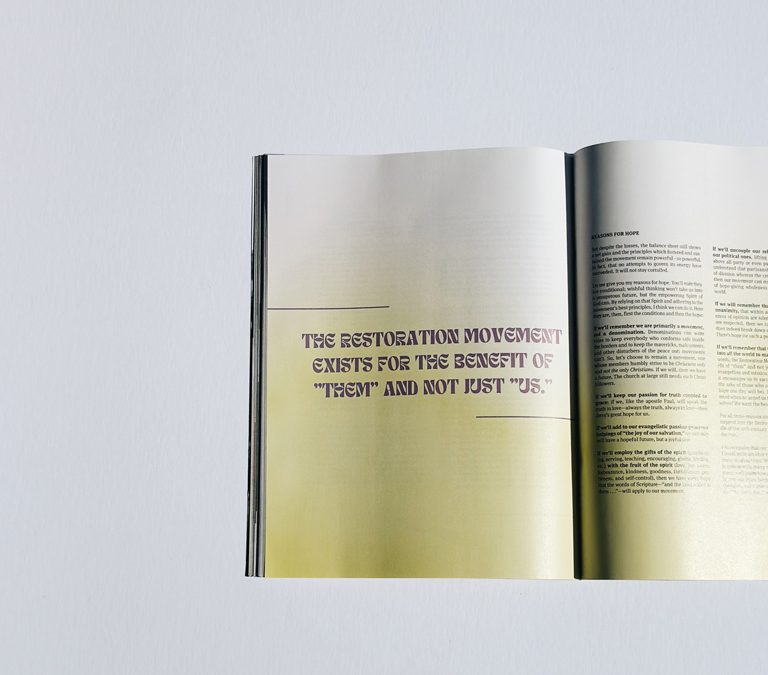By Bobby Harrington
I like to think of the historical roots of Christian Churches and the Restoration Movement through the lens of three fellowships that emerged from the time of Thomas and Alexander Campbell and Barton W. Stone in the early 1800s: to our left are the Disciples of Christ and to the right are the a cappella Churches of Christ.
In reality, the picture is not that clean.
The RENEW.org Network was launched five years ago as a renewal movement within the Restoration Movement. At RENEW.org, we seek to provide clarity in our postmodern time by articulating the best of Restoration Movement theology focused on disciple-making. Because of that clarity and our common roots, many from a fourth branch of the Restoration Movement known as the International Churches of Christ are moving to work with those of us within Christian Churches/Churches of Christ.
Here is a quick guide to understanding the International Churches of Christ (ICOC).
Where Did the International Churches of Christ Come From?
The ICOC started in the early 1980s as a group of leaders and churches began to pull away from the a cappella Churches of Christ over evangelism, obedience, racism, and discipleship. By the early 1990s the split was complete, and they had become a separate fellowship. Their original dominant leader was Kip McKean, and through his influence they received widespread criticism for cultic practices, sectarian theology, and abuse.
Many came to know of these churches as the Boston Movement because that was McKean’s home base and their center of leadership until McKean moved to Los Angeles. By 2001 the fellowship of churches rejected McKean’s leadership and started reorganization efforts. Since that time, many of the churches have gravitated toward Christian Churches. But the majority are still isolated within their own distinct fellowship.
Where Are Their Churches?
The ICOC have a bigger impact around the world than in North America, but they also have some strong pockets within North America. They made great strides at establishing churches in every major city in the world until the early 2000s when they lost steam because of concerns over their abusive practices and sectarian theology. They are seeking to address these concerns in many quarters and now have over 700 churches in 155 nations around the world.
What Are Their Strengths?
I have spent a lot of time with ICOC leaders over the years and I have been able to carefully process their strengths and weakness. In 2017 I was invited to a meeting with some leaders from the ICOC to share my observations. Most of the leaders present at that meeting in Florida and at a subsequent meeting in Los Angeles in 2018 valued and agreed with my assessment, so I will share that summary below in the hope of helping more of us move forward together. My summary of the strengths of the ICOC:
1. A commitment to the lordship of Jesus and the necessity of repentance
2. A commitment to the lordship of Jesus through obedience to Scripture
3. A commitment to discipleship as the core mission of the church
4,. A commitment to the ministry of all believers
5. A commitment to racial integration
6. The eternal stakes of fulfilling or not fulfilling the Great Commission
7. The uniform practice of a simple, effective, and reproducible model of studies that ground everyone in the same theology
8. The empowerment of women to use their gifts within the moderate bounds of male leadership
What Have Been Their Weaknesses?
It is tricky to describe the weakness of other people or a fellowship of churches. I acknowledge the logs in my own eyes, personally, and within our fellowship of churches (Matthew 7:1-5). Also, when I made my presentation of the weaknesses described below, I was gentler and more nuanced than I can be in this short article. And I must emphasize that the leadership of the churches within the International Churches of Christ are working to improve and modify what I describe. Here is a summary of the weaknesses of the ICOC:
1. A weak or distorted theology of grace (they taught they were the only true church)
2. An inadequate theology of the indwelling Holy Spirit (they did not acknowledge this as the sign of salvation as in Romans 8:9)
3. Advocating that only disciples could be baptized, based on a faulty exegesis of Matthew 28:18-20
4. Too many control and intimidation tactics previously used
5. A weak theological and scholarly rootedness
6. The tendency for many people who converted within these churches to become lukewarm and passive when they did not have the external pressure of their accountability system
7. A vulnerability to become progressive or turn back to legalism because of the pressures of our postmodern world
8. An inclination to be overly restrictive and to lack fellowship with leaders and churches outside their orbit
Why Should We Embrace Leaders and People from Within International Churches of Christ?
They need us, and we need them. We can help them, and they can help us.
In the last five years I have spent significant time with many leaders in this movement seeking to draw them into the RENEW.org Network and the influence of Christian Churches. Here are seven strategic moves:
1. Build Relationships: Proximity builds trust; distance breeds mistrust. We have the same historical and theological family to build upon in our relationships.
2. Provide Theological Clarity: RENEW.org’s theological clarity can provide the kind of theological foundation that ICOC people need—and help them avoid drifting toward either progressivism or back to legalism. Most leaders from the ICOC find quick affinity with RENEW.org’s leadership faith statement (beliefs representing the best of Christian Churches/Churches of Christ)—and it gives them security to see our strong commitment to Scripture, baptism, repentance, faithfulness, etc.
3. Emphasize Disciple-Making: We share a common commitment to disciple-making as the core mission of the church—it is their core ministry focus.
4. Emphasize Racial Diversity: They can help us with racial diversity, which is one of their unique attributes. We desperately need that within Christian Churches/Churches of Christ.
5. Emphasize Women in Ministry: Those of us who uphold the theological priority of male elders and lead ministers/pastors can benefit from the path of women in ministry in the ICOC.
6. Plant Churches with Them: One thing that has held back the ICOC has been their approach to having one church (only) in each city. That idea is breaking down and there is great promise in planting churches together with Christian Churches.
7. Find Ways to Collaborate: We can help each other through collaboration in ways that will bind us better to each other and help us all to be more resilient as we move into the future.
I am a big believer in the future of Restoration Movement ideals. I believe that the best home of future disciple-making movements can be within the Restoration Movement. Let’s seek to work with whomever shares these ideals with us!
Bobby Harrington serves as lead pastor at Harpeth Christian Church, Franklin, Tennessee, and the point leader for Discipleship.org and RENEW.org.





The First Principles Studies that these 2 groups adhere to are very legalistic in nature and are not exegetical studies. Kip McKean claims he authored this indoctrination system in order to be separate from the lost Protestant and Catholic religions. 90 percent of all baptisms over the last 43 years have left this group. Many are devastated psychologically.
I am resistant to the notion that the renew movement is part of the restoration movement. One of the primary reasons for this is that I have discovered via the renew website which I am signed onto. Many congregations advertising on there have nothing to do with the restoration movement and even some that have the name Christian church or Church of Christ in the name of their congregation teach doctrines of man not found in Scripture. For example I am finding that many of these congregations are teaching that the proper response to hearing the gospel is to lift holy hands and pray a sinner’s prayer and then they are celebrated as being Christians or being in Christ and no such method is found in Scripture. Many of these congregations only view being immersed into Christ as a sign or a symbol as opposed to a reality and they teach that it is for church membership only. Many of these congregations also are actually part of the Middle Ages Reformation movements based on man’s word teaching examples.
Greetings to everyone!
My request is What different there is in church of christ (coc) and international church of christ?
Appears this congregation has carried much of their abusive practices from their first dissolution in 2003. There are a myriad of posts online/YouTube of examples of the abuse and trauma they have instilled in people. Many have left their faith because of this. If we care about salvation as much as we say we do we must condemn this demonic cult with all fervor.
I was a member of Crossroads COC almost 40 years ago beginning when I was 17. And after that time spent some time with the acapella COC and independent Christian churches until my mid 20’s. Kip McKean (who was Evangelist for Boston CoC back in the day) was trained and sent out from Crossroads. So I was there during the early years although that was still almost 20 years after the Discipling Movement began among Churches of Christ which later became the ICOC.
Anyway, what John Montoya wrote about their First Principles is right. I agree with him and that is a warning the Christian Churches should take seriously. I know some ICOC reformed but the root is rotten. Crossroads made many mistakes but at least they were concerned about love for people and the message of the cross. And still the leaven of bad discipleship creeped in. Call it the Shepherding Movement among Churches of Christ.
What ICOC fails to understand or appreciate is the LEVEL the Holy Spirit leads and directs the body of Christ. Biblical leadership, pastors/elders, deacons has their place in scripture as we know. And yes they can delegate Bible study leaders among cell groups and disciple from there. But when you over ride the will of some people, put huge demands and works on people, there’s a point where the leading of the Holy Spirit is replaced by human leaders. Toxic leaders. Let the Holy Spirit lead.
Discipleship is simply body life with the ultimate goal is Christ Jesus being formed in you. That is, body life…the church/people living their lives out day to day and the ultimate goal among us is “Christ being formed in you/us”. The over reaching shepherding, “accountability partners” or discipleship partners those terms are not found in scripture probably for a reason. Jesus with His disciples before the crucifixion (3 years) is a good example for discipleship.
Leave room for the Holy Spirit to lead. An example is in Acts 15:36-41 with Paul and Barnabas disagreeing over John Mark. Both had good reasons to either not include John Mark or forgive him and let him go with them. Who was right? Who was wrong. GOD was right. God worked that out. Paul went out and so did Barnabas and John Mark. And they were fruitful in spreading the gospel.
It’s hard to explain. I remember being at Crossroads and during fellowship, after the message, I looked around the auditorium/sanctuary and saw everyone fellowshipping and how we rely so much on each other and all I could think was “Devoid of the Spirit.” Nothing wrong with fellowship, we need that. But we did not leave room for the Holy Spirit to lead. If anything that was “an excuse to do nothing.” And that came from some in the COC who taught the Holy Spirit does not indwell each Christian. Given O Blakely and Guy N Woods debated that in 1985. Around that time is when I left the COC for the Christian Church where I was living at that time.
Ten years ago I visited an ICOC and on baptism they believed my baptism was not valid if I was not a disciple before I was baptized at Crossroads Church of Christ. Watch for that. Put another way, with some individual exceptions, ICOC members are taught the rest of the Restoration Movement are not saved unless they were disciples before baptism. Talk about works salvation. Somehow they missed Romans 4 and 5.
To clarify I was with Calvary Chapel, a small one, for 20 years. I’m not writing this as a current member of a RM church. If there was a independent Christian Church where I live I’d probably go to one but I prefer book by book expositional teaching and preaching with some exception. I’m only saying this because I don’t want to give the idea I’m a member of the COC or Independent Christian Church…wanting to be honest with you all.
And so in closing I’m one of many of the people who left the Discipleship Movement among Churches of Christ or ICOC. If we were a religious movement we’d be the fastest growing movement in America during the early 90’s into the early 2000’s. The sad part is many fell away. I’d read the letter Henry Kriete wrote and consider if they believe your baptisms are valid or even saved in their minds before working with them.
Both the ICOC and the author of this article seem very numeric growth oriented. Both take the concept of Christ’s 12 and Christ’s closest 3 in the same way that Robert Coleman does- as holding the secret to disciple making, though there are ZERO examples of this interpretation before the 20th Century. Both seem to have this humanist focus on ministry, approaching it more as a business model. If the ICOC and Renew find they have common ground, it makes sense, but I want no part in it. I’m already bombarded with American Capitalism, I don’t want it infecting my relationship with God and others.
Please include this link in your information about this cult:
https://icoc-icclawsuits.com/
If you want to learn more about the ICOC directly from former members, I found this podcast very eye opening-keep in mind the ICC (International Christian Church) is now the “second” movement according to the same leaders who ran the ICOC.
Aldo B. Martin Presents: The Reclamation
The 4houses Road church of Christ need prayer and opportunity that will help us grow